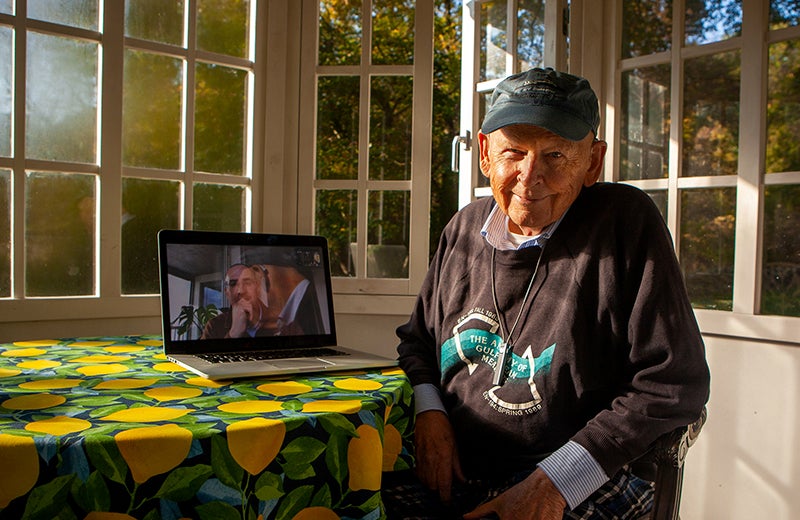
By Janine Weisman
No need to sugarcoat the reason why Tom Rossby no longer goes to sea.
“It’s not responsible at my age to do that sort of stuff,” says the University of Rhode Island emeritus professor of oceanography.
“I’m in good health and all that jazz but first of all, you don’t want to take spots away from younger people.”
Exactly the careful approach and deliberate mindset you would expect from Rossby, 83. His career studying ocean circulation has mostly focused on the Gulf Stream and he is known for urging caution to those eager to proclaim that this major current is weakening as sea levels rise in a warming climate.
So far, he says, the science does not support such a leap. Decades of data back him up.
In 1990, Rossby came up with the idea of putting an acoustic Doppler current profiler (ADCP) in the hull of the container vessel Oleander, which operates weekly between Bermuda and Port Elizabeth, New Jersey. ‘Ideas are cheap—the challenge is implementing them,’ Rossby likes to say. It took a couple of years to go from a drafted grant proposal to installation. The resulting academic-maritime industry partnership has served as a model for other data collection efforts, including the installation of an ADCP on the high-seas ferry Norröna, which makes a weekly round trip between Denmark, the Faroe Islands and Iceland.
Data captured since 2009 by Norröna helped to calibrate hydrographic data extending back to the early 1900s for a study published last May in Geophysical Research Letters. Rossby conducted the time series analysis and co-author Léon Chafik framed the results alongside recent literature and debate over whether the Nordic Seas branch of the meridional overturning circulation (MOC) was slowing down. The findings showed the flow of warm water into the Nordic Seas has remained stable.
“It’s a slightly provocative paper, not terribly provocative,” Rossby offers.
But Chafik, 34, a researcher in the Department of Meteorology at Stockholm University, suggests Rossby was downplaying the paper’s influence.
“It’s a very important and powerful result,” Chafik says.
The two met a decade ago when Chafik was still a Ph.D. candidate. Rossby, a regular guest at Stockholm University where his father founded the meteorology department, was excited to learn Chafik’s research interests focused on the Nordic Seas.
They have published at least one paper every year since 2014. Chafik was lead author of a study published in July in Nature Communications documenting a new ocean current that transports cold and dense water toward the Faroe Bank Channel. The discovery refuted long held assumptions that this deep flow along the northern slope of the Faroes turned directly into the Faroe-Shetland Channel. Instead, water takes a much longer path to the continental margin outside Norway before flowing south to the channel.
It turns out Rossby was behind Chafik’s first ever research cruise in 2011 to the Labrador Sea aboard R/V Endeavor.
“He said, ‘You need to get some sea legs. We need to put you in the ocean,’” Chafik recalled.
Rossby estimates he has spent two years total doing science on the water over the past five decades. He still has lots of work to do on land even as pandemic lockdowns prevented him from returning to Sweden this year. Chafik’s plan to spend a month in Rhode Island consulting with Rossby on a paper also never happened.
They talk at least a couple times a week, but the work is not the same in person, Chafik says. Rossby challenges him in a way that motivates the younger scientist to dig deeper.
“I think Tom often says, ‘Nooo… that can’t be right,” Chafik says with a laugh. “It’s part of the fun with Tom actually.”
